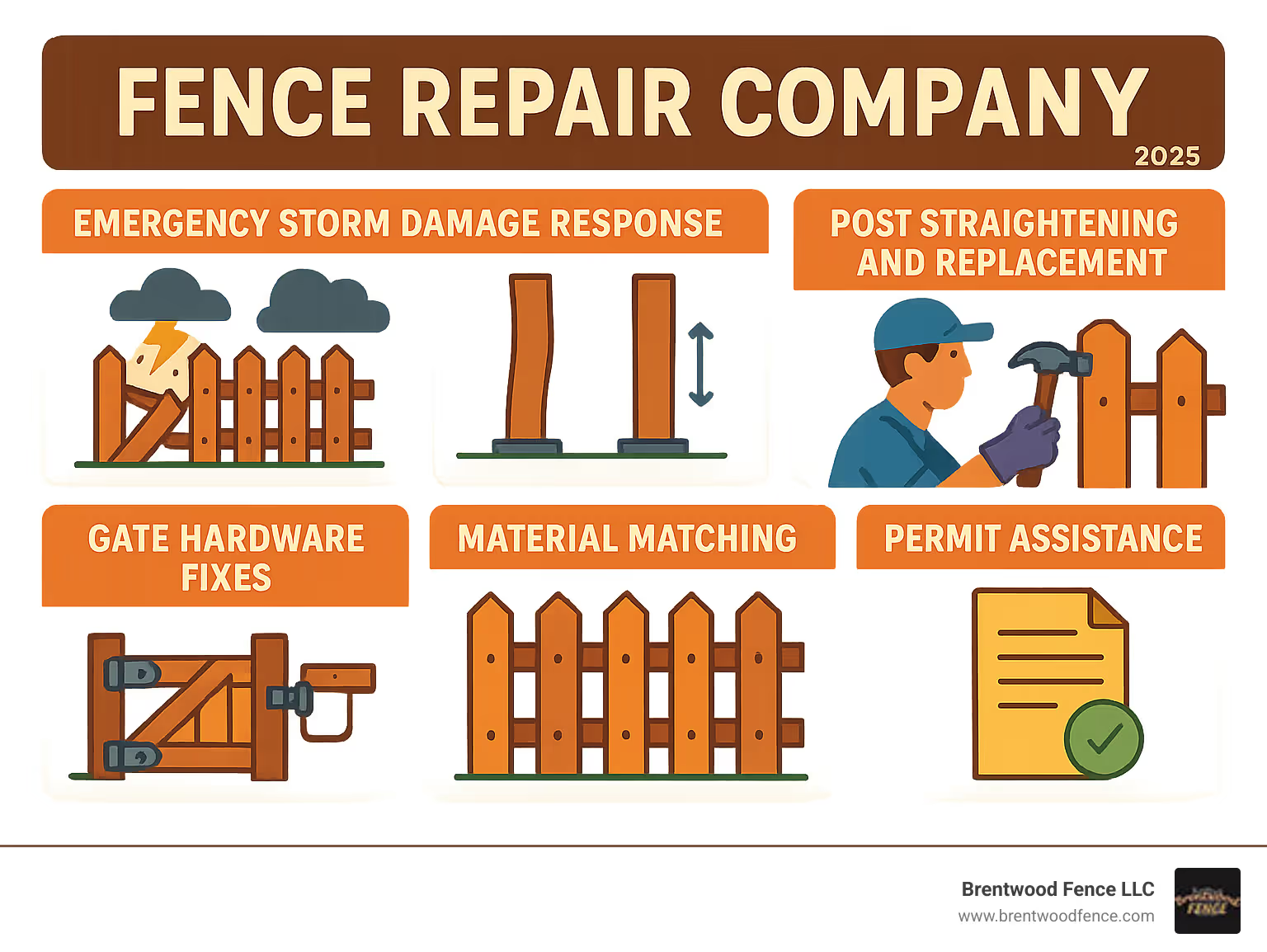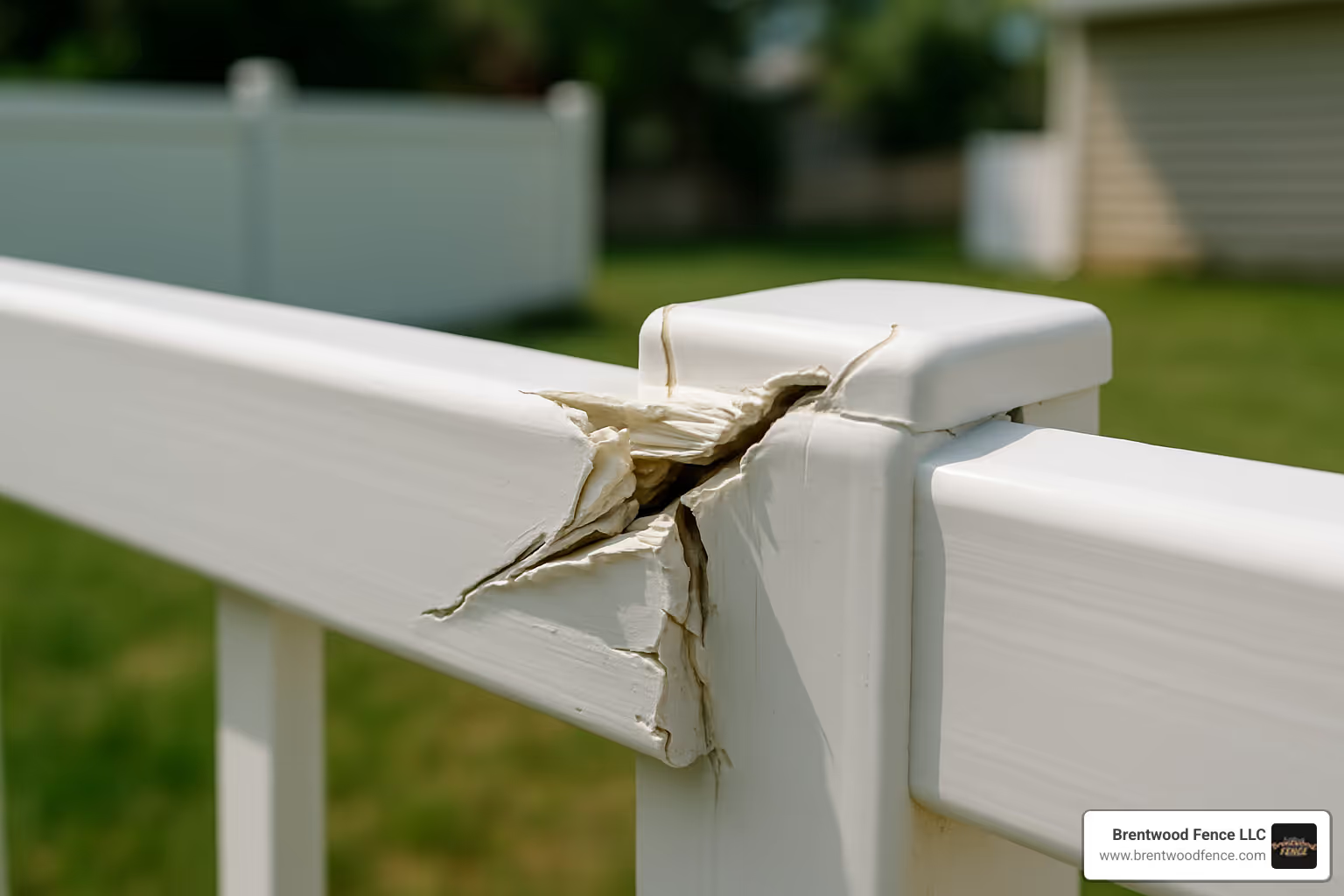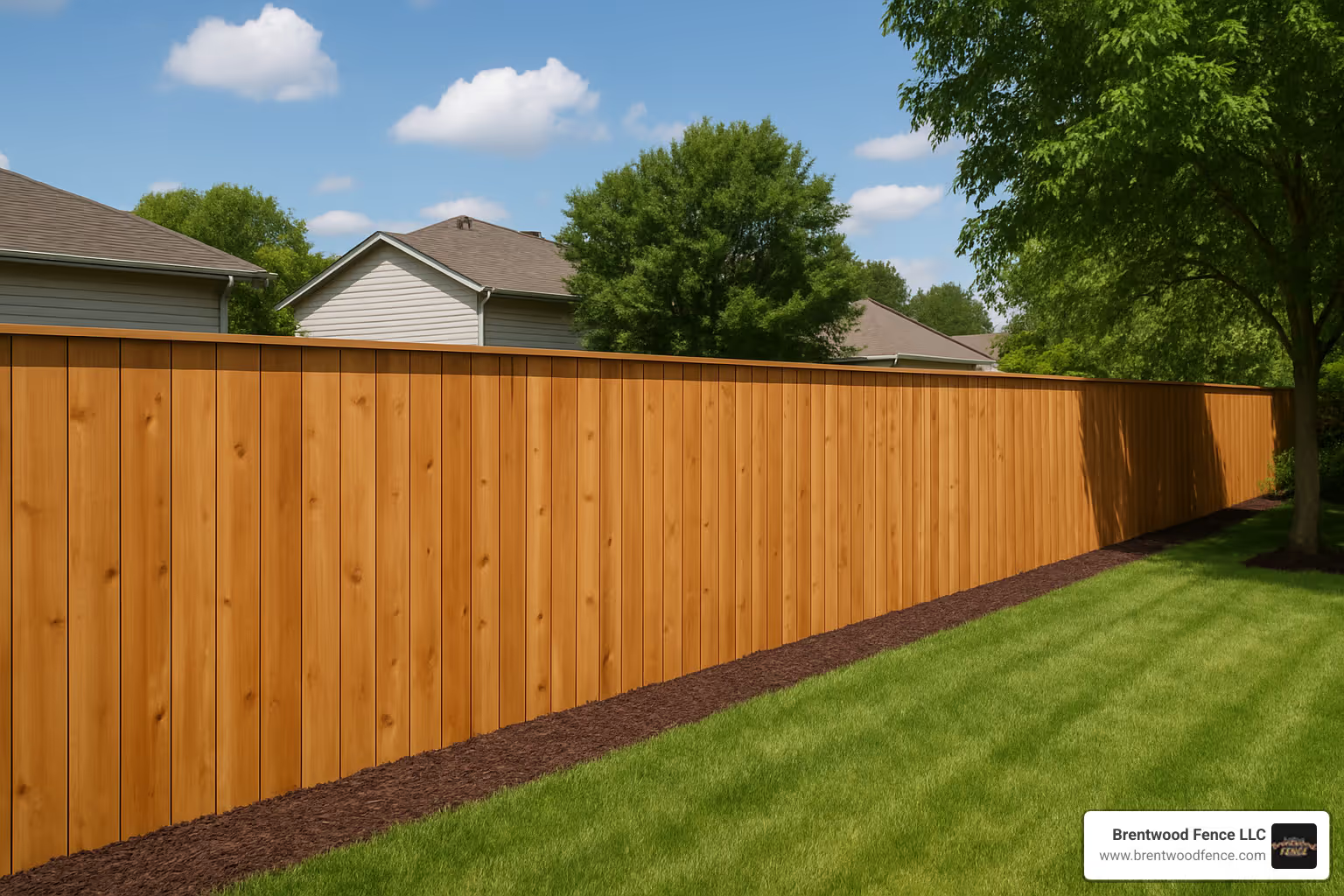Blog Content
17
Jul
2025

When your fence starts leaning, sagging, or falling apart, finding the right fence repair company becomes crucial for protecting your property value and family safety. A damaged fence creates security risks, lets pets escape, and can violate local property codes.
What fence repair companies typically offer:
Most homeowners face fence problems after severe weather, with wind damage and soil shifting being the top culprits. The average fence repair costs between $250-$800 depending on damage extent and materials involved.
Professional fence repair companies handle everything from simple picket replacements to complex post realignment. They carry insurance, understand local codes, and have the tools to fix problems safely.
"Even though he is the expert he included me in every step of the project," noted one satisfied customer about their fence repair experience.

Fence repair company terms at a glance:
We'll walk you through everything you need to know about hiring a fence repair company smartly. From identifying damage that needs immediate attention to understanding repair costs and timelines, this guide helps you make informed decisions without breaking the bank.
Fences face constant challenges from weather and everyday wear. Understanding when you need a fence repair company can save you from bigger problems later.
Storm damage is the biggest issue we see. Wind doesn't just knock down sections - it can twist posts, snap boards, and turn your privacy fence into a safety hazard.
Leaning posts happen when soil shifts, concrete footings fail, or age takes its toll. What starts as a slight lean becomes a complete failure if ignored.
Broken pickets result from impact damage, pet activity, or years of weather exposure. Sometimes it's just normal aging finally winning the battle.
Gate sag is practically inevitable. Hinges wear out, posts shift, and suddenly your gate drags on the ground. A sagging gate becomes a daily wrestling match.
Rotten wood starts small but spreads quickly. Even pressure-treated lumber eventually surrenders to New England's humidity and freeze-thaw cycles.
Rusted metal components turn sturdy fences into safety hazards when bolts snap and brackets fail.
Insurance claims often involve fence damage, but navigating coverage requires documentation and proper repair estimates. Professional companies know how to work with insurance adjusters.
Permit requirements vary by location. While minor repairs won't raise eyebrows, structural repairs often need official approval.

Some fence problems can wait. Others need immediate attention:
Loose posts top the danger list. If you can wiggle a post like a loose tooth, call professionals immediately. Loose posts create domino effects.
Wobbly gates are accidents waiting to happen. Gates that won't latch properly can trap fingers, knock over children, or let pets escape.
Splinter hazards on wood fences can slice through skin. If you're afraid to touch your fence, it needs professional attention.
Safety risks around pools, playgrounds, or busy streets can't be ignored.
Wind damage leads our repair calls, especially after storms. We see everything from minor casualties to complete sections relocating to neighbors' yards.
Pet damage surprises homeowners with its creativity. Dogs excavate escape tunnels, treat pickets like chew toys, and body-slam gates until hardware surrenders.
Soil heave during freeze-thaw cycles shifts fence posts. This is particularly problematic in clay soils common throughout New England.
Mower hits happen more often than homeowners admit. String trimmers gradually weaken posts and rails at the base.
Every fence material has its own personality and repair needs. Understanding your fence type makes conversations with your fence repair company more productive.
Material Lifespan vs Repair Difficulty:
New England's freeze-thaw cycles, coastal salt air, and surprise storms test every fence material to its limits.
Cedar wood fencing remains popular for good reason - it's naturally rot-resistant and handles our climate well. But even cedar has limits.
Trouble usually starts where wood meets earth. Posts absorb moisture, creating perfect rot conditions. Warping happens when boards dry unevenly after soaking.
Board replacement becomes necessary when warping gets severe or pickets split beyond repair. Matching replacement boards to existing fencing requires skill - wood ages differently depending on sun exposure and moisture.
Vinyl fencing is the "set it and forget it" option until something breaks. Most vinyl problems are straightforward fixes.
Cracked panels result from impact damage or extreme temperature swings. Unlike wood, you can't patch vinyl - damaged sections need complete replacement.
Color matching with vinyl is simple compared to wood staining. Manufacturers maintain consistent standards, so colors match across years.
Chain-link delivers honest security at budget prices. Most problems are equally straightforward.
Bent fabric from impact damage can usually be repaired without replacing entire sections. Professional crews have specialized reshaping tools.
Post replacement involves cutting out damaged sections and fitting new galvanized pipe - labor-intensive work requiring proper tools.
Ornamental metal makes a statement but requires specialized repair skills.
Rust removal prevents spread to deeper metal. Coastal properties face accelerated rust from salt air.
Welding repairs restore damaged sections to like-new strength, but require skilled technicians and proper equipment.

Working with a professional fence repair company should feel straightforward. The best companies follow a proven process from damaged fence to beautiful repair.
Everything starts with thorough site inspection. Good repair crews don't just look at obvious damage - they find root causes that might create future problems.
Most reputable companies offer free quotes. Your estimate should break down material costs, labor, permits if needed, and cleanup. No surprises, no hidden fees.
Timeline estimates account for weather, material delivery, and permit processing. Companies promising unrealistic timelines set you up for disappointment.
Before digging begins, utility location becomes crucial. Professional crews call 811 (Dig Safe) at least 72 hours before starting work.
Material ordering requires careful planning for perfect color and style matches. The best companies maintain supplier relationships to minimize delays.
Debris removal should be included in your service agreement. Professional companies properly dispose of materials and clean work areas.
Warranties vary by company and repair type, but you should always receive written coverage for materials and workmanship.
Property line verification prevents disputes and ensures repairs stay within legal boundaries. HOA approval might be required for visible repairs in planned communities.
Pet safety is essential for both animals and repair crews. Secure pets away from work areas during repairs.
Landscaping clearance around work areas prevents plant damage and provides equipment access. Trim vegetation at least three feet from fence lines.
Professional crews take safety seriously - hard hats, safety glasses, steel-toed boots, and high-visibility vests are mandatory. Daily cleanup keeps work areas safe throughout the project.
Cure times vary by material and weather. Concrete typically needs 24-48 hours before supporting full loads.
Stain timing is crucial for wood repairs. New cedar needs 60-90 days before staining to allow moisture to escape.
Warranty documentation should clearly explain coverage terms and how to request service if problems arise.
Fence repair company costs in New England reflect skilled workforce and higher living costs, with typical labor rates ranging from $75-$125 per hour depending on complexity and location.
Specialized work like welding or custom material matching commands premium rates, but often provides lasting results. Material prices have fluctuated significantly, with cedar costs jumping while vinyl and metal stayed more predictable.
Fence height dramatically affects repair costs. Anything above six feet often requires scaffolding or specialized equipment, increasing labor time and safety requirements.
Access issues impact final bills too. Narrow gates, prize-winning flower beds, or challenging terrain require more time and care. We factor these challenges into estimates upfront.
Post count drives many repair costs since posts are the most labor-intensive part. Setting posts properly requires digging, concrete work, and precise alignment.
For larger repairs, financing options help spread costs over manageable payments. Many fence repairs qualify for home improvement loans with favorable conditions.
The good news? ROI on fence repairs typically exceeds 50% in increased property value. Well-maintained fencing improves curb appeal and provides security that buyers value.
Minor fixes under $250 cover everyday repairs - replacing individual pickets, adjusting gate hardware, or patching small sections. These typically take 2-4 hours.
Section replacement costs $250-$800 depending on size and material. This includes removing damaged sections, installing new posts if needed, and matching existing materials.
Full fence line replacement runs $800-$2,000+ depending on length and complexity. At this price point, complete replacement might make more financial sense.
Emergency repairs command premium rates, typically 50-100% above standard pricing, but prevent additional damage and protect property security.
Age matters significantly. Fences over 75% of expected lifespan may warrant replacement rather than extensive repairs.
Structural integrity assessment determines whether repairs can restore proper function. Extensive post damage often makes replacement more economical.
Code changes sometimes require upgrades triggering replacement needs. Insurance payouts may favor replacement when repair costs exceed 50-60% of replacement value.
Finding the right fence repair company doesn't have to be overwhelming. A few key factors separate the pros from the pretenders.
Licenses and insurance should be your first checkpoint. Any legitimate company needs current licenses for each state they serve. Don't hesitate to ask for proof – reputable companies are happy to show credentials. Comprehensive liability and workers' compensation insurance protects you if something goes wrong.
Local reviews tell the real story about customer satisfaction and work quality. Check multiple sources including Google, Better Business Bureau ratings, and local community forums. Look for patterns – one bad review might be an outlier, but consistent complaints are red flags.
Portfolios and past projects reveal whether a company has experience with your specific fence type. Ask to see photo galleries and request references from recent customers.
Timeline commitments matter more than you think. Reliable companies provide realistic schedules and communicate about delays. Weather and materials can affect timelines, but good companies plan for challenges.
Cleanup policies vary dramatically. Some include complete debris removal in pricing, others charge extra. Make sure you understand what's included before signing contracts.
For additional DIY background or simply to expand your knowledge, you can browse The Home Depot fence installation guide, which offers clear overviews of common fence types and maintenance tips.
Crew size affects project timeline and efficiency. The best companies match crew size to project requirements.
Ask about lead times upfront, especially during busy seasons. Honest companies provide realistic scheduling and honor committed dates.
Material sources affect quality and timeline. Companies working with established suppliers can minimize delays and ensure consistent quality.
Warranty terms protect your investment. Look for written warranties covering both materials and workmanship.
Google reviews provide recent customer feedback and show how companies respond to criticism. Look for high ratings and professional responses to all reviews.
BBB ratings indicate business practices and complaint resolution. A+ ratings show commitment to customer satisfaction.
Neighborhood referrals offer trusted recommendations from people who've seen work quality firsthand.

The best fence repair companies understand that choosing a contractor involves trust. They're patient with questions, transparent about processes, and proud to show their work.
The best fence repair company will tell you that preventing damage is always cheaper than fixing it. Think of fence maintenance like regular home upkeep - a little effort now saves major headaches later.
Annual inspections are your first defense against costly repairs. Check your fence twice yearly: spring after winter damage, and fall before harsh weather. Look for loose posts, cracked boards, rusty hardware, and signs of rot or insect damage.
Sealant application keeps wood fences lasting longer. High-quality sealers protect against moisture, UV rays, and temperature changes. Most wood fences need fresh sealant every 2-3 years, though coastal conditions might require annual treatment.
Your landscaping choices affect fence longevity. Plant trimming prevents vegetation from destroying fences. Vines look charming until they pull down posts. Tree branches become battering rams during storms. Keep a 12-inch clearance zone around fence lines.
Soil grading prevents expensive foundation problems. Water pooling around posts accelerates rot and causes shifting. Grade soil so water flows away from your fence.
Hardware maintenance needs seasonal attention. Gate hinges, latches, and connections require checking twice yearly. Loose hardware problems get worse fast if ignored.
Winter brings special challenges. Snow clearance prevents overloading that snaps boards or bends posts. Remove heavy snow from fence tops and avoid piling snow against fence lines.
Sprinkler system adjustments save more fences than you'd think. Direct water spray creates perfect rot conditions. Adjust heads to water lawns, not fences.
Most repairs wrap up in a single day, assuming good weather. Simple fixes like replacing broken pickets or adjusting gates usually take 2-4 hours from start to finish.
Replacing entire fence sections requires 4-8 hours, depending on scope and whether we need new post holes.
Weather plays a huge role in scheduling. We won't work in dangerous conditions, and concrete needs proper curing conditions.
Material availability affects timing. Common materials are usually ready, but custom colors or unusual profiles might require special orders.
Local codes vary significantly. Minor repairs like fixing pickets or replacing gates typically don't need permits.
Height changes or major structural work often do require permits. Historic districts add complexity with strict material and method rules.
Don't forget HOA requirements if applicable. Even when towns don't require permits, homeowners associations might need approval.
Custom stain matching is possible, but challenging when fences have weathered for years. Sun, rain, and time change stain appearance dramatically.
We keep common stain samples and create custom matches. Vinyl and metal are easier to match perfectly since manufacturers maintain consistent color standards.
Test swatches are always recommended before applying stain to large areas. This ensures you're happy with the final result.
Your fence is more than just a boundary - it's your property's first line of defense against weather, intruders, and wandering pets. When damage strikes, you need a fence repair company that understands both the urgency and importance of getting it right the first time.
At Brentwood Fence LLC, we've spent decades perfecting our craft across New Hampshire, Massachusetts, and Maine. We know how brutal New England winters can be on fencing, and we've seen every type of damage Mother Nature can dish out. More importantly, we know how to fix it properly.
Our expert craftsmanship goes beyond patching holes or replacing broken boards. We find root causes - whether it's poor drainage causing post rot, soil heave from freeze-thaw cycles, or inadequate hardware finally giving up. This approach means repairs last longer and save money long-term.
Free estimates show respect for your time and budget. We'll walk your property, explain what we see, and give honest advice about whether repairs make sense or if replacement might be smarter. No pressure, no surprises - just straight talk from neighbors who care about doing right by the community.
Regional service means we understand that coastal properties face different challenges than inland homes. We know which suppliers stock the best materials and which permits you might need. When you call us, you're getting neighbors with a reputation to protect.
Our satisfaction guarantee isn't just marketing - it's how we sleep well at night. We warranty our work because we believe in it, and we're here when you need follow-up service or have questions later.
Don't let fence problems turn into bigger headaches. Whether it's storm damage needing immediate attention or routine repairs you've been putting off, we're here to help. Contact our local fence pros today and let's get your fence back to protecting what matters most to you.
Copyright 2022 Brentwood Fence | All Rights Reserved | Sitemap | Website by Plumb Development a Digital Marketing Agency